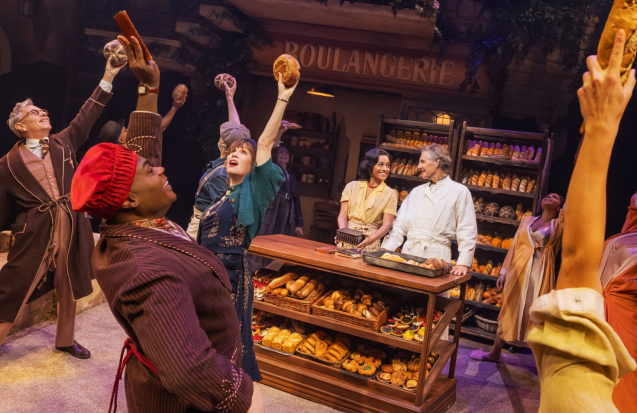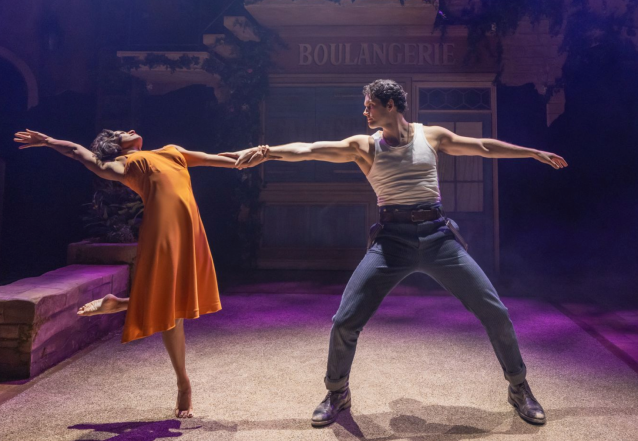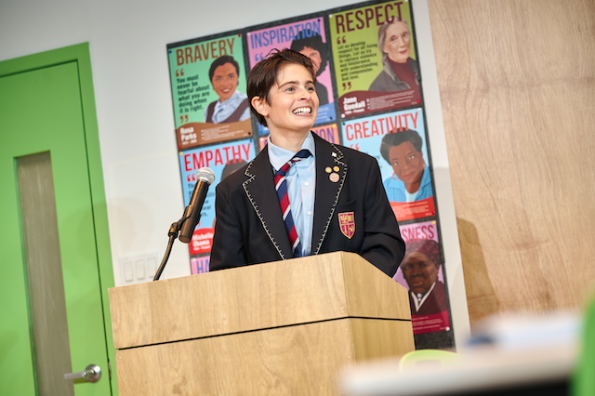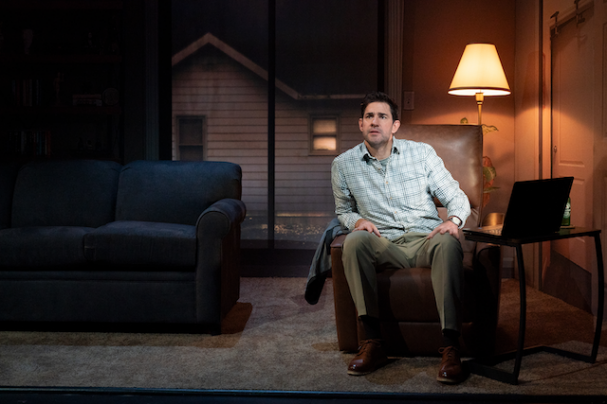
Ariana Debose, Scott Bakula and the Ensemble (Photo: Matthew Murphy and Evan Zimmerman)
The Baker’s Wife
By Marc Miller
The pretty young woman is erotically drawn to the sexy young stud, but for plot reasons she’s committed to the much less attractive older man, and after a tryst with the young hottie, remains so. Surprise, it’s three musicals! Fanny (1954), in which Harold Rome, whose usual demographic was working-class New York Jews, proved he could write French; The Most Happy Fella (1956), in which Frank Loesser proved he could write semi-operatically; and The Baker’s Wife (1976), in which Stephen Schwartz, coming off a hot streak of Godspell, Pippin, and The Magic Show, proved he could write anything.
It’s almost universally acclaimed as a masterwork score, but The Baker’s Wife has a tortured history. David Merrick closed it out of town after a painful, extended tryout. Schwartz and Joseph Stein, the librettist, adapting Marcel Pagnol and Jean Giono’s 1938 film, kept rewriting, and various versions have popped up across the globe in the intervening years. The current version, at Classic Stage Company, might be the best Baker’s Wife yet, and the production is, in every respect—casting, visuals, orchestra, sound—sumptuous. But it still hasn’t crossed the finish line.
To be sure, much of it is delightful. The set, by Jason Sherwood, may be the smartest use of the CSC space ever. We’re surrounded by it: a small 1930s Provence village climbing the theater walls, with stucco homes, balconies, stairways, vines, and Bradley King’s evocative pastel lighting. Denise (Judy Kuhn), who co-owns the café with husband Claude (Robert Cuccioli), is setting up for the day. When you have Judy freaking Kuhn to open the show with Schwartz’s gorgeous “Chanson,” about observation and experience transforming everyday occurrences into special keepsakes, you know the casting agent, The Telsey Office, did its job.
It’s a simple story. The town, starved for bread since the death of the local boulanger, is eagerly awaiting the arrival of his replacement, the amiable Aimable (Scott Bakula), who arrives with his young bride, Geneviève (Ariana DeBose). Aimable proves so good at his job that the townspeople keep singing about how delicious everything is. But Geneviève, who married him for security and to forget an unhappy affair, is bored and disconsolate. She does her best to resist the advances of Dominique (Kevin William Paul), the impulsive, ridiculously handsome chauffeur to the Marquis (Nathan Lee Graham), who’s also the mayor, and whose three lissome “nieces” clearly aren’t relations. But she eventually cracks and runs off with him, just after unveiling her feelings with “Meadowlark.”

Ariana Debose, Kevin William Paul (Photo: Matthew Murphy and Evan Zimmerman)
This is the one song that has had an afterlife, in hundreds of performances by hundreds of cabaret divas, and it’s a supreme Schwartz achievement: It’s melodic, it invents an entire fairy tale worthy of Hans Christian Andersen, it explains why she’s leaving, and it forwards the action. A just-starting Patti LuPone introduced it in 1976; some critics, and some online theater chatters, have opined that DeBose doesn’t entirely do it justice. I think she knocks it out of the park, and she also does beautifully by “Where Is the Warmth?”, her second-acter where she decides the liaison with Dominique isn’t working. By then, Aimable, devastated by his wife’s departure, has stopped baking, and that’s why the citizens are determined to help him.
So that’s where we get to know the populace better, and where the distractions multiply. Stein, best known for his flawless book to Fiddler on the Roof, overloaded this one with subplots and local color. Denise and Claude are constantly bickering, his misogyny, shared with the local men, not helping. A teacher (Arnie Burton) woos a spinster (Alma Cuervo) to clear her out of the square for ulterior motives—can you guess what happens? Two locals, who owing to familial rivalries in previous generations refuse to speak to each other, are assigned by the Marquis to go off together and look for Geneviève—can you guess what happens? Hortense (Sally Murphy), verbally bullied by her husband, goes off to visit her sister—will she declare independence or go back to the tyrant, can you guess? A priest (Will Roland) pontificates. Antoine (Kevin Del Aguila), the town drunk, annoys everyone.
It’s too crowded, and the townspeople hijinks run so thick after intermission that Geneviève has barely anything to do, except that one song. Gordon Greenberg, the director, and Jill Rafson, CSC’s artistic director, both wrote eloquent program notes about how the show is about community, but what we’re really interested in are Aimable and Geneviève.
Scott Bakula is a fine actor with a solid voice; he may not be an ideal Aimable. Lean and tall, his face weathered but still handsome, he’s not the kindly shlump essayed by Raimu in 1938, or Lenny Wolpe in the 2005 Paper Mill Playhouse production, which this one most closely follows in text. He does ably land “Any–Day–Now Day,” in which Aimable tries to jolly himself after being abandoned, and “If I Have to Live Alone,” where he concedes defeat and resolves to live with dignity. But “cuckold,” as Antoine keeps calling Aimable, is not a natural fit for this actor. He and DeBose, who’s excellent, actually make a lovely couple.

Ariana Debose, Scott Bakula (Photo: Matthew Murphy and Evan Zimmerman)
Schwartz expanded the score after the out-of-town closing, and not all the additions are assets. “The Luckiest Man in the World,” with the townsmen trying to convince Aimable that bachelorhood is best, isn’t as funny as it thinks it is. “Feminine Companionship,” with the Marquis offering Aimable his nieces as chattel, is downright vulgar, and so is Stephanie Klemons’ bump-and-grind choreography. (I liked the rest of her work, which is unspectacular but character-specific.) But “Romance,” with the women of the town lamenting their lack thereof, works, especially with the authoritative Kuhn pushing it along.
Kuhn, Cuccioli, Cuervo, Burton, Murphy, Graham, Del Aguila—what a magnificently overqualified cast. As Dominque, Paul surely looks the part; his high notes are a little thin. An eight-piece orchestra, large for off-Broadway and well conducted by Charlie Alterman, makes Schwartz’s score sound as luscious as it ever will, and a special shout-out to sound designer Jason Crystal—that purring from Aimable’s and Geneviève’s missing cat is so convincing, audience members were glancing offstage to see if it was real. Catherine Zuber’s costumes are period humdingers: check out the Marquis’s white hat and suit. And Greenberg’s direction, aside from mismanaging the accents—some actors go Gallic, some don’t, some switch back and forth—is both sympathetic and well blocked.
So many delights, then, chief among them that score and that set; all that’s needed is a little judicious cutting, and maybe a cast change or two. The Baker’s Wife is almost done, but after 50 years, it’s still not quite out of the oven.
The Baker’s Wife
At Classic Stage Company
136 E. 13th St.
Running time: 2 hours 30 minutes, with one intermission
Through December 21, 2025




